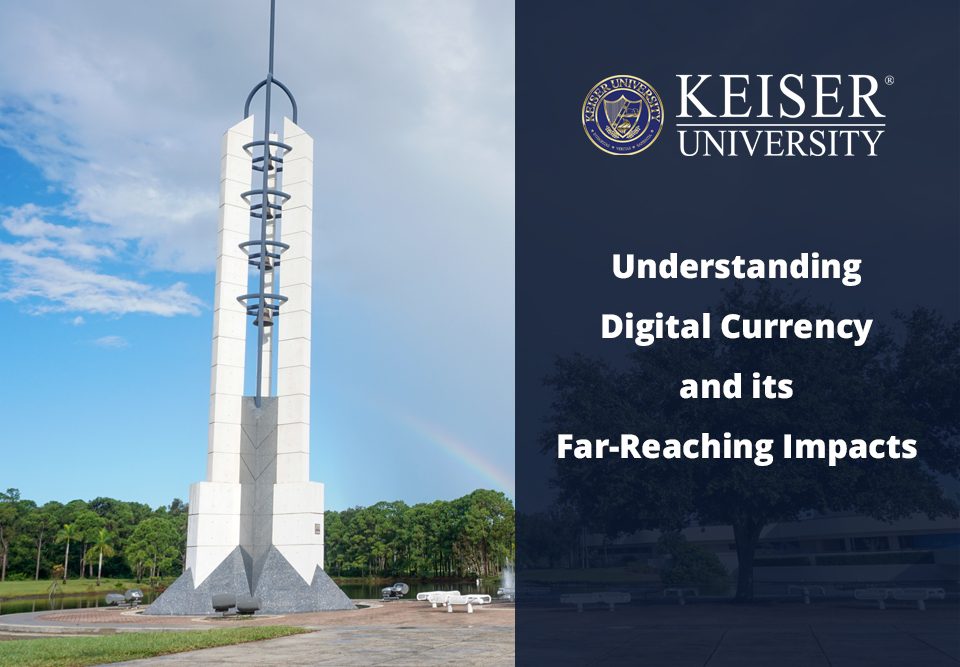In a relatively short period of time, the concept of digital currency has evolved from something of a novelty to a very real and valuable form of currency. Not only have digital currencies affected the way people spend and save money—but they have also impacted entire central banks and the global economy.
If you’re interested in a career in business, fintech, accounting or a similar field, you’ll need a solid understanding of what digital currencies are and the impact they continue to have on the global market. Not only is digital cash likely here to stay—but you will likely be working with it in your future career.
What Are Digital Currencies?
A digital currency refers to any form of currency that exists solely in an electronic form. These money assets can be stored, managed and exchanged over the internet using connected computer systems. Unlike cash liquidity or even a credit card, a digital currency does not exist in any kind of physical form. Some other common terms that are interchangeable for digital currency include digital money and electronic money.
Types of Digital Currencies
Sometimes, you’ll hear the terms “digital currency” and “cryptocurrency” used interchangeably—but it’s important to note that these are not synonymous. Simply put, cryptocurrency is a type of digital currency, but crypto has its own characteristics (such as a decentralized nature) that makes it unique.
In fact, there are many different digital currency companies, each offering their own digital cash option. Let’s explore some of the most common types of digital currencies out there and what sets them apart from each other.
Central Bank Digital Currency (CBCD)
CBCDs refer to a form of digital currency issued by a central bank rather than a commercial bank. These currencies are made available to the public by the government. Several countries have begun rolling out their own central bank digital currencies, with the United States even testing some pilot programs.
Cryptocurrencies
Another popular type of digital currency is the previously mentioned cryptocurrency, which has become extremely popular over the past decade or so. Cryptocurrency is a form of digital currency where funds are exchanged through a computer network without any central authority to uphold them. Decentralization and use of a blockchain are the distinguishing characteristics of cryptocurrency, with popular types including Bitcoin, Tether, Dogecoin and Litecoin. Another thing that sets this type of digital currency apart from others is that they all exist in limited quantities—so there is only so much to be acquired.
Digital Fiat Currency
A digital fiat currency, on the other hand, is issued and controlled by a third party. These currencies can be issued at will by the central authority, which some believe can help to provide more economic stability because the issuing authority or government also backs the currency. Some examples of fiat currencies include the eEuro, the e-Yuan and the e-Dollar (which is still in its earlier stages of development).
Stablecoins
Stablecoins are a specific type of cryptocurrency where the value of the currency itself is directly tied to another currency or commodity. Examples include Tether, USD Coin and Binance USD. This type of digital currency is gaining popularity because they are designed to cut back on volatility in the market, offering more financial stability than some other digital currencies.
Mobile Money
Yet another form of digital currency is mobile money, which allows financial transactions to be carried out through a mobile device, such as a smartphone or tablet. These days, more people are using their phones to store their mobile money in a digital wallet; rather than taking out a physical credit card to pay for something, credit card information is stored directly on the device so the phone can be used to make a payment both online and in person.
Questions Behind the Use of Digital Currencies
Now that you have a better understanding of what digital currencies are and the different types available in today’s financial services market, you may be wondering why this all matters.
Well, if you plan to go into business, tech or finance in your future career, there’s a solid chance you’ll deal with various forms of global digital currency and cryptocurrency. Even if you aren’t going into a field that will rely on these currencies, some would argue that everyone will end up using digital currencies in the not-so-distant future.
With this in mind, let’s dive into some of the most compelling questions and issues surrounding digital currency and monetary policy in its current form. From whether digital currency is here to stay to issues around control and regulation of digital currency, there’s a lot to get into.
Are Digital Currencies the Future of Money?
For many reasons, some experts believe that digital currencies represent the future of money and how we exchange, save and spend it. There are many potential benefits of digital currency to consider, starting with the fact a government using a centralized digital currency bank could improve market stability and efficiency.
This is especially true when it comes to distributing money from government programs. Tax refunds, for example, could be processed and sent instantly by governments using a CBDC. From there, recipients would have access to their money instantly, rather than waiting for a check or other form of physical payment to arrive in the mail.
Another sticking point for digital currencies and their longevity is that they enable people to make inexpensive international transfers. This could be huge when it comes to the health of the global economy, as international currency transactions are currently very expensive due to currency conversions and other fees. If we were to eventually move to an international currency, these costs could be eliminated, and it would be just as easy to transfer money across the state as it would be to transfer money across the globe.
Finally, we live in a world where people increasingly want (and expect) services on-demand. This same concept applies to financial services. Currently, however, most banks and their services are only available during regular business hours. With a digital currency, everyone can enjoy around-the-clock access to all financial services because there is no need for a centralized authority to process payments after regular business hours.
All this is to say that only time will tell the true impact that digital currencies will have on the global economy and how we handle money. However, many would agree that digital currencies are the future of money—and most people will be using them within the next decade or so.
Challenges of Digital Currencies
Of course, digital currencies don’t come without some inherent challenges and controversies. There are several potential drawbacks and roadblocks that need to be considered before we can move toward an international digital currency.
Currently, some would argue that there are simply too many digital currency options—especially when it comes to cryptocurrency. With too many options available, things can become overwhelming for those who are looking to get started understanding digital currency. Likewise, an excess of options results in some inherent limitations as we determine which currencies are here to stay and which may be phasing out.
For many just getting into digital currency, there is also a bit of a learning curve; the concept of cryptocurrency and other types of currency can be difficult for some to grasp. Users will need to learn how to properly store their digital currencies and perform other tasks, which can be complicated because of the sheer number of digital currencies and systems that currency exist.
Volatility is yet another issue with digital currency that cannot be ignored. Prices and values for some types of digital currency (including crypto) can change in the blink of an eye. This makes many businesses and individuals hesitant to use them. Many agree that
CBDCs can cut down on volatility due to their centralized nature, but most countries are still a very long way away from developing and using any kind of CBDC.
Government Rules, Regulations and Involvement
Likewise, there is a lot of concern and questions over digital currency regulations and government involvement. One of the primary draws of cryptocurrency, for example, is its decentralized nature and the fact that there is no government oversight or regulations involved with this type of currency. Of course, this lack of oversight and regulation leaves some feeling uneasy about its use.
On the other hand, some argue that centralized forms of digital currency (such as CBDC) present their own potential problems. Many are skeptical about the government having oversight over this type of currency, so there is a fair amount of controversy here.
Who Should Implement and Control Digital Currencies?
Currently, there are no “rules” regarding who can implement a new digital currency. This is exactly why there are so many diverse types of cryptocurrencies available. Some enjoy this independent aspect of the market, whereas others call for more control over who can implement new digital currencies.
The Economic Impact of Digital Currencies
Even though they haven’t been around very long when compared to traditional forms of currency, digital currencies have had a significant impact on the global economy and the way central banks/financial institutions operate.
Central Banks and Financial Institutions
Most notably, central banks have majorly disrupted the traditional model of the central bank. With more people relying on digital currencies than ever before, some are ditching their “traditional” banks and financial institutions in favor of digital currencies that are available 24/7. This, in turn, has forced banks to make some of their own changes to keep up with the competition. Expanding business hours, making more services available online, and even cutting back on fees for things like international money transfers are all changes we have seen in banking since the adoption of digital currency.
Interested in Learning More?
There’s no denying that digital currencies have changed the way we save, spend, and transact with money. It’s likely that digital currencies are here to stay, though only time will tell what kinds of changes and developments we’ll see in the coming years.
If you’re interested in getting into a field that will use digital currency, Keiser University has program options available to suit your needs. From undergraduate and graduate degrees to certificate programs and more, you can find what you’re looking for. Explore our MS in Financial Technology, MBA in Technology Management, Master’s in Business Administration or even a Master of Accountancy today. You can also get in touch to request more information!






 The instructors at Keiser University impacted my life. They believed in my ability to become a great graphic designer, regardless of how I felt about my skills. KU helped to prepare me for the real world and got me to where I am today.
The instructors at Keiser University impacted my life. They believed in my ability to become a great graphic designer, regardless of how I felt about my skills. KU helped to prepare me for the real world and got me to where I am today.
